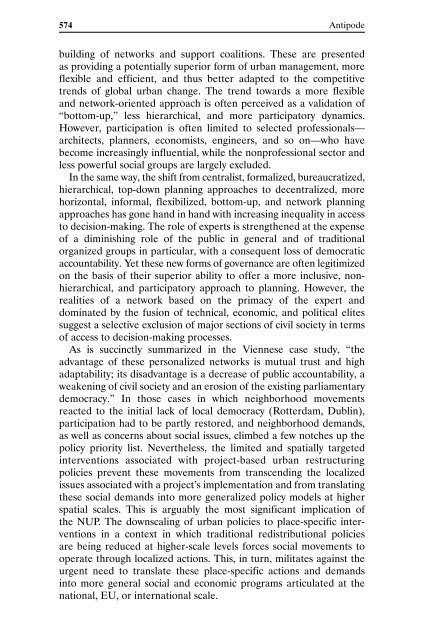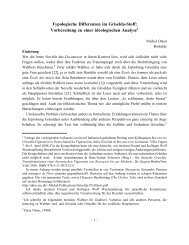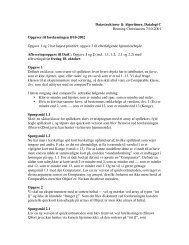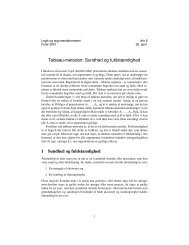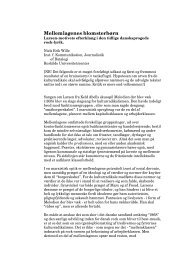Large–Scale Urban Development Projects and the New Urban Policy
Large–Scale Urban Development Projects and the New Urban Policy
Large–Scale Urban Development Projects and the New Urban Policy
Create successful ePaper yourself
Turn your PDF publications into a flip-book with our unique Google optimized e-Paper software.
574 Antipode<br />
building of networks <strong>and</strong> support coalitions. These are presented<br />
as providing a potentially superior form of urban management, more<br />
flexible <strong>and</strong> efficient, <strong>and</strong> thus better adapted to <strong>the</strong> competitive<br />
trends of global urban change. The trend towards a more flexible<br />
<strong>and</strong> network-oriented approach is often perceived as a validation of<br />
“bottom-up,” less hierarchical, <strong>and</strong> more participatory dynamics.<br />
However, participation is often limited to selected professionals—<br />
architects, planners, economists, engineers, <strong>and</strong> so on—who have<br />
become increasingly influential, while <strong>the</strong> nonprofessional sector <strong>and</strong><br />
less powerful social groups are largely excluded.<br />
In <strong>the</strong> same way, <strong>the</strong> shift from centralist, formalized, bureaucratized,<br />
hierarchical, top-down planning approaches to decentralized, more<br />
horizontal, informal, flexibilized, bottom-up, <strong>and</strong> network planning<br />
approaches has gone h<strong>and</strong> in h<strong>and</strong> with increasing inequality in access<br />
to decision-making. The role of experts is streng<strong>the</strong>ned at <strong>the</strong> expense<br />
of a diminishing role of <strong>the</strong> public in general <strong>and</strong> of traditional<br />
organized groups in particular, with a consequent loss of democratic<br />
accountability. Yet <strong>the</strong>se new forms of governance are often legitimized<br />
on <strong>the</strong> basis of <strong>the</strong>ir superior ability to offer a more inclusive, nonhierarchical,<br />
<strong>and</strong> participatory approach to planning. However, <strong>the</strong><br />
realities of a network based on <strong>the</strong> primacy of <strong>the</strong> expert <strong>and</strong><br />
dominated by <strong>the</strong> fusion of technical, economic, <strong>and</strong> political elites<br />
suggest a selective exclusion of major sections of civil society in terms<br />
of access to decision-making processes.<br />
As is succinctly summarized in <strong>the</strong> Viennese case study, “<strong>the</strong><br />
advantage of <strong>the</strong>se personalized networks is mutual trust <strong>and</strong> high<br />
adaptability; its disadvantage is a decrease of public accountability, a<br />
weakening of civil society <strong>and</strong> an erosion of <strong>the</strong> existing parliamentary<br />
democracy.” In those cases in which neighborhood movements<br />
reacted to <strong>the</strong> initial lack of local democracy (Rotterdam, Dublin),<br />
participation had to be partly restored, <strong>and</strong> neighborhood dem<strong>and</strong>s,<br />
as well as concerns about social issues, climbed a few notches up <strong>the</strong><br />
policy priority list. Never<strong>the</strong>less, <strong>the</strong> limited <strong>and</strong> spatially targeted<br />
interventions associated with project-based urban restructuring<br />
policies prevent <strong>the</strong>se movements from transcending <strong>the</strong> localized<br />
issues associated with a project’s implementation <strong>and</strong> from translating<br />
<strong>the</strong>se social dem<strong>and</strong>s into more generalized policy models at higher<br />
spatial scales. This is arguably <strong>the</strong> most significant implication of<br />
<strong>the</strong> NUP. The downscaling of urban policies to place-specific interventions<br />
in a context in which traditional redistributional policies<br />
are being reduced at higher-scale levels forces social movements to<br />
operate through localized actions. This, in turn, militates against <strong>the</strong><br />
urgent need to translate <strong>the</strong>se place-specific actions <strong>and</strong> dem<strong>and</strong>s<br />
into more general social <strong>and</strong> economic programs articulated at <strong>the</strong><br />
national, EU, or international scale.


